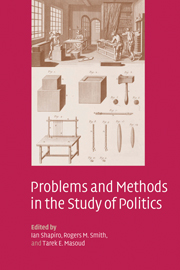1 - Introduction: problems and methods in the study of politics
Published online by Cambridge University Press: 22 September 2009
Summary
Political science, particularly in the United States, is often said to be a fractured discipline – perpetually split among warring camps (or “separate tables” to use the late Gabriel Almond's evocative phrase (1988)). Partisans articulate their positions with passion and intensity, yet the nature of what divides them is hard to pin down. At times we hear of a stand-off between “qualitative” scholars, who make use of archival research, ethnography, textual criticism, and discourse analysis; and “quantitative” scholars, who deploy mathematics, game theory, and statistics. Scholars in the former tradition supposedly disdain the new, hyper-numerate, approaches to political science as opaque and overly abstract, while scholars of the latter stripe deride the “old” ways of studying politics as impressionistic and lacking in rigor. At other times the schism is portrayed as being about the proper aspirations of the discipline – between those who believe that a scientific explanation of political life is possible, that we can derive something akin to physical laws of human behavior, and those who believe that it is not. For partisans of the latter view, the stochastic nature of politics and the unpredictability of human action mean that the best we can do is explain specific events – with as much humility and attention to context as possible. At still other times the rivals are portrayed as “rational choice theorists,” whose work is animated by the assumption that individuals are rational maximizers of self-interest (often economic, sometimes not), and those who allow for a richer range of human motivations.
Information
- Type
- Chapter
- Information
- Problems and Methods in the Study of Politics , pp. 1 - 16Publisher: Cambridge University PressPrint publication year: 2004
References
Accessibility standard: Unknown
Why this information is here
This section outlines the accessibility features of this content - including support for screen readers, full keyboard navigation and high-contrast display options. This may not be relevant for you.Accessibility Information
- 3
- Cited by
